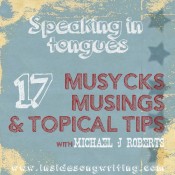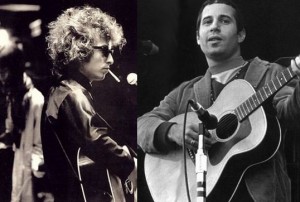Speaking in Tongues

Musycks Musings 17
Speaking in tongues
A weekly column by Inside Songwriting contributor, Michael J Roberts.
A topic that turns up time and again, how much musicianship and musical knowledge is required to become a good songwriter? It’s the kind of question that mostly gets a how long is a piece of string? response, but in reality the answer may be a little clearer, and the clues may lie in the ability to understand a foreign language, so let’s begin…
Watching good musicians play together is to witness a conversation in a different language, and it is plain when you see they speak the same musical language, the conversation sparks and moves, creating something memorable. Music is a language that operates along the same lines as other languages, a fact that is not widely understood amongst many songwriters. If we accept that songs are mostly written or explored in two halves, words and music, then it transpires that a lot of writers pay attention to the obvious ‘language’, component i.e. the words – the language of the poetry of songwriting, but don’t go as far with the musical side, which can be equally poetic. This may be because music also operates in a way that transcends words, but when the similarities are fully appreciated I think many writers will rethink their ability to fluently ‘speak the language’ of music.
If you like inside songwriting, please subscribe to the podcast and share with those whom you find appropriate!
Language, in all its forms, is an evolving and dynamic communication tool, utilitarian in its most common application but not without some of the mystical dimension of music at its core. How does spoken language work, what does it share with music? Language is more than just a collection of syllables, working as it does by also incorporating elements of expressive dynamics and tone. The spoken word can operate at an intuitive, even mystical level, something often seen as the province of music. Throughout history, religious fundamentalists have often lapsed into a heightened state of emotional ecstatic fervour, spouting declarative gibberish with rabid abandon, the so-called ‘speaking in tongues’. Far from having a supernatural explanation, the phenomenon is rooted in the deeply human need to express and reach out for an experience beyond words, and area music knows something about.
Sound can exist before exact meaning can often be attached; something that is made more complex by the paradox that sound carries with it its own intrinsic meaning. Consider the most basic of exchanges, common to all cultures and eras, that of a parent to new born; a parent need only coo in soft tones with a smiling face, and words are redundant. A gentle and mellifluous delivery of something terrible like “you are the spawn of Satan and I’m sorry you were born,” will be met with gurgling, smiling wonderment from the young child, whereas a loud, gruff and threatening tone as you say “I love you more than anything in the world,” will likely bring upset and tears. How often have we tried to understand someone speaking a foreign language to our own, and have been able to at least gather the gist of the conversation, if not the nuance and detail, via tone and facial expression?
Writing can be a very solitary discipline, and consequently many singer-songwriters spend a lot of time ‘talking to themselves’, a practice that by definition must limit their vocabulary when stacked up against the benefits of open and expansive conversations with other musicians. If you don’t have the requisite vocabulary you can’t get into a ‘deep’ conversation, one that has some meaning. Imagine you’re in a foreign country and only have rudimentary language, say schoolkid French and you’re swanning down the Avenue des Champs-Élysées and strike up a conversation, what happens? You might ask directions to the Eiffel Tower, or then walk into a Café and order a coffee and croissant, but talking about anything in an expansive way is impossible, no matter that you may in fact share some deep interests with people you come across, so talking about the stuff that actually gives life meaning is not going to happen.
The spoken/sung word is a powerful thing, it has the ability to soothe or wound, to inspire or repulse the listener, and songwriters need to be across every part of nuance and meaning when employing and expanding their vocabulary. It is the same with music. What’s the best methodology to employ in learning this musical language? Studying notation and theory, or ‘reading the dots’ is one way, but it’s hardly necessary as many brilliant modern musicians are musically illiterate in terms understood by the great composers. There are some fine musicians who can extemporise and improvise and yet never learnt to read a note of music, they learned like a child learns language, by listening and then attempting to copy what they’ve heard. And by doing it often, with people fluent in the language, and by not giving up.
If reading is a fine (and solitary) way to expand your command of words, then mastery of song-craft is obviously aided by practice on an instrument. Unlike reading, playing your instrument is best augmented by joining others and stretching the limits of your technique and understanding. It is, of course, no small thing to write a great three chord song that touches or resonates with people, and many great writers don’t get much beyond the classic Tonic, Sub-Dominant and Dominant chords blocks that form the majority of modern pop and folk/blues music, but some writers need more and their curiosity will lead them to chromaticism of one form or another.

I’m not the first (and won’t be the last) to note the two great examples of expanding musicality as against staying with a limited range, namely the two great folk icons of the 1960’s, Paul Simon and Bob Dylan. Dylan has largely stayed in the thrall of the Tonic, Sub-Dominant and Dominant relationships, and has easily moved from Folk to Blues as the two forms are similarly rooted around that axis. Bob has relied on many collaborators to flesh out his musical ideas over the journey, and has explored some chromaticism lately in the vein of 1930’s style classic writing, but has mostly adopted the persona of a grizzled Blues troubadour, whereas Paul Simon, after the initial Folk success, focused on educating himself in order to be able to incorporate complex Jazz and Baroque Pop elements into his writing. Simon even went to the trouble of studying classical composition at Columbia University in the early ‘70s, even as his Bridge Over Troubled Water was at number one, and it paid dividends as he created the masterful American Tune (based on a Bach piece) soon after. The jazz overtones of much of his ‘70s writing would not have been possible without his expanding of his musical options as he learned to speak in fluent chromaticism.
So remember, music is a language and as with any language there are advantages in being able to speak it fluently. Learn the entry level phrases and gradually get more ambitious in your exchanges, as with spoken language you soon learn when to join in, when to shut up, when to shout, when to use a whisper, after all it’s all about communication. If you want to join deeply in the conversation then you’ll need to find a way to improve your language skills, or at least find a great translator! But that’s another story.
Happy writing.
Musycks.
Michael J Roberts has written some brilliant books on the subject of songwriting:
www.insidesongwriting.com.au/books


